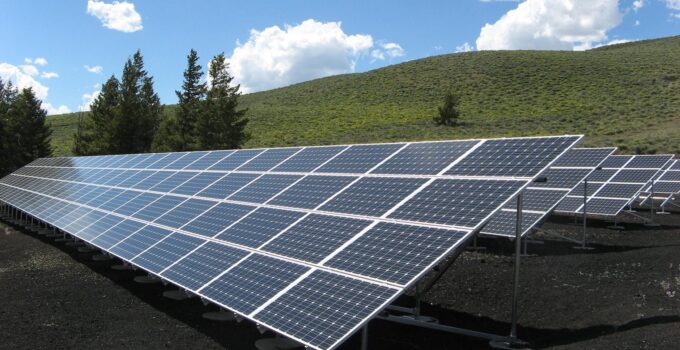Solar panels have gained significant popularity in recent years as a sustainable energy solution. With the growing concern for the environment, many people are curious about how solar panels help mitigate environmental issues.
In this article, we will explore the benefits of harnessing solar energy and how it contributes to a greener planet, improves air quality, conserves natural resources, limits pollution, supports ecosystem conservation, and more.
Reducing Carbon Footprint: How Solar Panels Contribute to a Greener Planet
Solar panels are a key player in reducing carbon footprint and promoting a greener planet. By harnessing the power of the sun, solar panels generate clean and renewable energy without emitting harmful greenhouse gases.
Traditional energy sources like coal and natural gas contribute to the majority of global carbon dioxide emissions. Solar energy, on the other hand, does not release any harmful pollutants during the generation process.
Solar panels help combat climate change by reducing the reliance on fossil fuels and decreasing the emission of greenhouse gases into the atmosphere. The more solar energy we utilize, the less we depend on non-renewable resources and the more we can reduce our carbon footprint.
Renewable Energy Source: Exploring the Sustainable Power of Solar Panels
Solar panels are a prime example of a renewable energy source. Unlike fossil fuels, which are finite and depleting, solar energy is a sustainable and virtually inexhaustible resource. The sun provides an abundant amount of energy every day, and solar panels efficiently capture and convert this energy into usable electricity.
Renewable energy sources like solar power play a crucial role in diversifying our energy mix and reducing our dependence on fossil fuels. By embracing solar energy, we can reduce our reliance on traditional energy sources, decrease greenhouse gas emissions, and create a more sustainable future.
Mitigating Air Pollution: How Solar Panels Help Improve Air Quality
Air pollution is a major environmental concern that affects the health and well-being of both humans and ecosystems. Traditional energy sources such as coal-fired power plants release harmful pollutants like sulfur dioxide, nitrogen oxides, and particulate matter into the air. These pollutants contribute to smog, acid rain, and respiratory issues.
Solar panels offer a cleaner alternative by producing electricity without any emissions. By switching to solar energy, we can significantly reduce air pollution and improve air quality. This shift towards cleaner energy sources helps protect human health, preserve natural habitats, and support a thriving ecosystem.
Preserving Natural Resources: The Role of Solar Panels in Conserving Fossil Fuels
The extraction and consumption of fossil fuels, such as coal, oil, and natural gas, have severe consequences for the environment. These resources are non-renewable and take millions of years to form. As we continue to deplete these resources, it becomes crucial to explore alternative energy solutions.
Solar panels offer a sustainable energy option that helps preserve natural resources. By harnessing the power of the sun, we can reduce our reliance on fossil fuels for electricity generation. This shift not only conserves valuable resources but also reduces the environmental impact associated with their extraction and combustion.
Limiting Land and Water Pollution: The Environmental Impact of Solar Energy
Conventional energy sources often require significant land and water resources for extraction, transportation, and power generation. These activities can lead to land degradation, deforestation, and water pollution. On the other hand, solar energy has a minimal environmental footprint and can be harnessed in various locations, including rooftops, deserts, and unused land.
Solar panels occupy relatively small spaces and do not produce any harmful byproducts that can contaminate water sources. By embracing solar energy, we can reduce land and water pollution associated with conventional energy sources, preserving natural habitats and ensuring the availability of clean water for future generations.
Promoting Biodiversity: How Solar Panels Support Ecosystem Conservation
Ecosystems around the world face numerous threats, including habitat destruction, pollution, and climate change. The transition to solar energy can contribute to the conservation of biodiversity and the protection of fragile ecosystems.
Solar panels have a small physical footprint and can be integrated into existing infrastructures without causing significant disturbances to natural habitats. By generating clean energy, solar panels help reduce the pressure on ecosystems and wildlife that are impacted by traditional energy extraction and generation.
The use of solar energy also supports the development of sustainable practices that prioritize the protection of biodiversity. By embracing solar panels, we contribute to the preservation of ecosystems, the preservation of endangered species, and the overall health of our planet.
Expert Advice: How Do Solar Panels Help the Environment?
As an expert in the field, I highly recommend harnessing solar energy to help protect and preserve our environment. Solar panels offer numerous benefits, including reducing carbon footprint, providing a sustainable energy source, improving air quality, conserving fossil fuels, limiting pollution, and supporting biodiversity.
By installing solar panels, you can contribute to a greener planet, reduce greenhouse gas emissions, and take an active role in combating climate change. The switch to solar energy not only benefits the environment but also offers long-term financial savings through reduced energy bills and potential incentives.
Frequently Asked Questions
Do solar panels really help the environment?
Yes, solar panels help the environment by reducing carbon footprint and greenhouse gas emissions. They provide a sustainable energy source that does not contribute to air or water pollution.
How do solar panels reduce carbon footprint?
Solar panels generate electricity without emitting harmful greenhouse gases, unlike traditional energy sources. By using solar energy, we can reduce our reliance on fossil fuels and decrease carbon dioxide emissions.
Can solar panels improve air quality?
Yes, solar panels can improve air quality by reducing the emission of pollutants associated with traditional energy sources. Solar energy generation does not release harmful pollutants such as sulfur dioxide or nitrogen oxides.
Are solar panels a sustainable energy source?
Yes, solar panels are a sustainable energy source as they harness the power of the sun, which is an abundant and renewable resource. Solar energy does not deplete natural resources and does not contribute to climate change.
Do solar panels contribute to biodiversity conservation?
Yes, solar panels support biodiversity conservation by reducing the environmental impact of traditional energy sources. Solar energy helps protect ecosystems, natural habitats, and endangered species.
What are the financial benefits of using solar panels?
In addition to the environmental benefits, solar panels offer financial savings through reduced energy bills and potential incentives such as tax credits or feed-in tariffs. The long-term cost savings can outweigh the initial investment.
By understanding how solar panels help the environment and embracing sustainable energy solutions, we can make a positive impact on the planet. The transition to solar energy offers a cleaner, renewable, and more sustainable future for generations to come.






